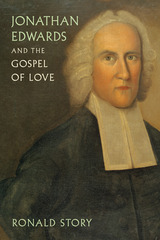
The first chapters trace Edwards's life and impact, examine his reputation as an intellectual, Calvinist, and revivalist, and highlight the importance for him of the gentler, more compassionate concepts of light, harmony, beauty, and sweetness. Story then explains what Edwards means by the "Gospel of Love"—a Christian faith that is less individual than interpersonal, and whose central feature is the practice of charity to the poor and the quest for loving community in this world, the chief signs of true salvation. As Edwards preached in his sermon "Heaven Is a World of Love," the afterlife itself is social in nature because love is social.
Drawing on Edwards's own sermons and notebooks, Story reveals the minister's belief that divine love expressed in the human family should take us beyond tribalism, sectarianism, provincialism, and nationality. Edwards offers hope, in the manner of Walter Rauschenbusch, Karl Barth, Martin Luther King Jr., and other great "improvers," for the coming of a world without want and war. Gracefully and compellingly written, this book represents a new departure in Edwards studies, revising the long-standing yet misleading stereotype of a man whose lessons of charity, community, and love we need now more than ever.

What does it mean to be an American, and how have individual Americans consciously endeavored to create their own identity? "Self-improvement," "self-culture," "self-made man," to "make something of oneself"--all are terms that were used from colonial to Victorian times. The particular language that framed the quest has fallen out of fashion, but it was a powerful cultural imperative for hundreds of years. The quest, in all its "post" guises, continues. Daniel Howe considers the ideas Americans once had about a proper construction of the self. Jonathan Edwards, Benjamin Franklin, Abraham Lincoln, Horace Bushnell, Horace Mann, Margaret Fuller, Henry David Thoreau, Dorothea Dix, Frederick Douglass, among others, engaged in discussion about the composition of human nature, the motivation of human behavior, and what can be done about the social problems these create. They shared a common model of human psychology, in which powerful but base passions must be mastered by reason in the service of virtue. How to accomplish this was often itself a subject of passionate controversy.
The story reveals that Americans both distrusted individual autonomy and were enthusiastic about it; passions, reason, and moral sense collided on how to manage it. Howe is empathetic to all the quests--for elites and artisans, blacks and women--seeing in them a basic pursuit of identity. The author demonstrates that aspirations for "self-control" and "self-discipline," grounded in conservatism and evangelical Christianity, also shaped movements that branched leftward to promote social welfare, feminism, and civil rights.
READERS
Browse our collection.
PUBLISHERS
See BiblioVault's publisher services.
STUDENT SERVICES
Files for college accessibility offices.
UChicago Accessibility Resources
home | accessibility | search | about | contact us
BiblioVault ® 2001 - 2024
The University of Chicago Press









